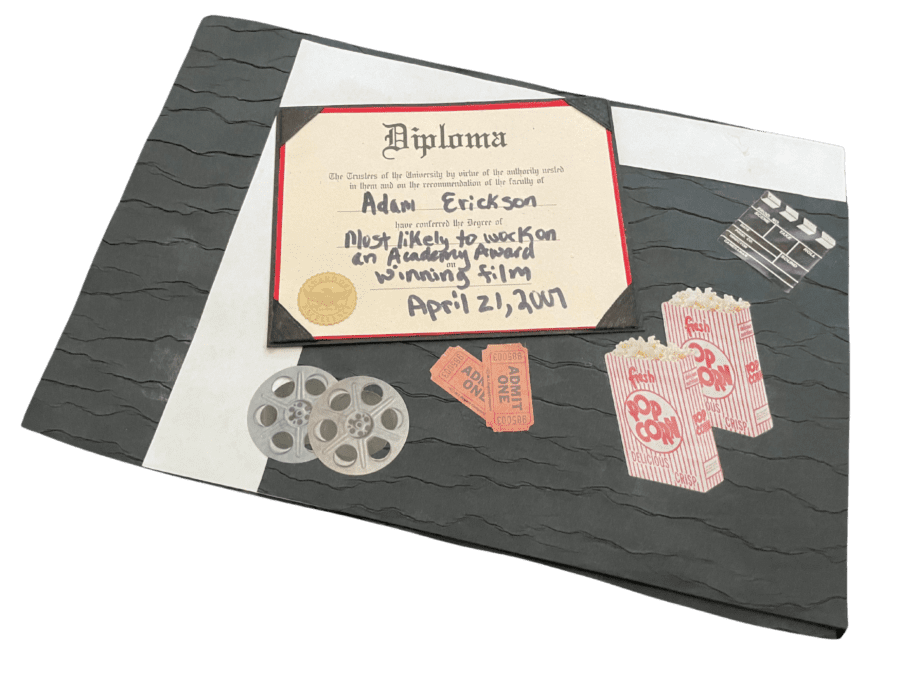I was working at a church and tasked with a pretty simple project – create a sermon bumper to set up our upcoming series. When I turned in the film project, I was proud of it–really proud. I had worked hard. A few hours later, after the critiques came in, I wasn’t proud anymore. They hated it. One of the problems with flaws is that we often don’t see them until they’re pointed out to us, and afterward, that’s all we can see. In the creative world, you need thick skin to accept critiques of your work so that you can get better, grow, and learn from different perspectives. But that initial feedback stuck with me. It played in my mind on repeat. On a good day, I might have viewed the feedback on my film project as constructive criticism because that’s what it was, but I didn’t take it that way. I let it define me.

That night, I trudged upstairs to my home office, while my wife and three kids laughed and played in the living room. Dropping into my chair, I stared at my shelves filled with career memorabilia special to me, but not worth much to anyone else. It used to inspire me to see my old cameras there, and VHS tapes of my grandpa’s silly infomercials, like “Mo Hair”-a product to help people grow hair. So goofy yet amazing. My Grandpa Erickson was the reason I discovered my love for filmmaking. But that night, my attention caught on the award I’d received in college from my peers: “Most Likely to Work on an Academy Award Winning Film.” It seemed to be making fun of me now, like I was kidding myself. I worked with really talented filmmakers. If I couldn’t hit that same level, and that was my main role, what was my worth? If I wasn’t a good filmmaker, who was I? I started to believe that if I didn’t measure up to those around me, then I certainly wasn’t worthy of serving God. I wondered if I should leave my job at the church.
I felt like an imposter. “They’re going to figure out I’m not really any good at this.” I spent more time worrying about people watching my work than I did creating it. I was sabotaging myself. I worked longer hours and spent less time with my family. I began to lose the joy in the things I normally loved to do. My spiral continued. “If I’m terrible as a filmmaker, maybe I’m a terrible father, too. My friends probably don’t want to be around me. Do I even really have friends?”
It’s a risk to open up to someone, to talk about what you fear most, but I was spiraling toward an emotional breaking point. I knew the enemy wanted me to hide what was eating me up inside, but I also knew God wanted me to bring it into the light so he could help me through it. I met with a Pastor for counseling, and something he said really stuck with me:
“Comparison is the root of all inferiority.”
He helped me realize that there will always be someone better in this race. But if I compared myself to who Christ says I was, I would realize my worth. Isn’t it interesting that the answer to comparison is to focus on someone who is perfect? I also talked with my team leads about how I was struggling…which was hard. But I’m blessed to work with good people who care and want me to succeed. They were voices of reason, helping me see that I’d been putting words in their mouths, making assumptions that weren’t true.
I had to ask myself some hard questions. “Who was I doing this for? For myself or for God? How was I defining my worth?”
A verse from Galatians helped me put things in perspective.
“Am I now trying to win the approval of human beings, or of God? Or am I trying to please people? If I were still trying to please people, I would not be a servant of Christ.” Galatians 1:10
When we allow the world to define us, we lose sight of who God says we are. We need to remember who we’re doing everything for in the first place and be honest with ourselves.
I’m becoming a better filmmaker because I know who I am now, and most importantly, whose I am. I am a child of God who has a purpose. It took the encouragement of those around me to remember why I do the work that I do, because I am called to help tell stories that point people to God. I love showing people how God’s grace and our perseverance can take us somewhere altogether new and unexpected.
Now, I don’t want to make it seem like it’s one-and-done. I still have days when I struggle. But I don’t stay down as long. I have more tools to help me and people to remind me of who I am.
Before, my identity was tied to the approval of others. But God doesn’t want me to compare myself to others. He wants me to see myself as he sees me. He wants that for you, too. We are loved, and we are enough.
For more inspiration on how to find your identity in God and not your work, check out our FILO Cohorts!















One Response
This really resonates—it’s so easy to feel proud of our work until we see it through someone else’s eyes. Critique can be tough, but it’s also a huge catalyst for growth if we lean into it instead of letting it define our worth. Thanks for sharing this reminder that thick skin and an open mind go hand in hand in the creative world!